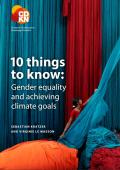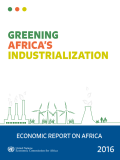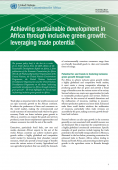
Although climate change and poverty are increasingly recognised as interlinked global problems, responses often focus on their scientific and economic dimensions only. This research study highlights the advantages and challenges of pursuing climate compatible development, i.e. inclusive green growth, from a gender perspective, pulling in evidence from projects in Asia, Africa and Latin America. The field work focused particularly on urban environments, as there is a relative paucity of data from cities, compared to rural areas.
While international frameworks are gradually becoming more aware of gender issues, all too often gender is simply “added” to existing policies. Women’s views, needs and participation are frequently excluded from climate change responses and development initiatives. Moreover women are often perceived as victims with little consideration for the contribution and leadership they could provide in adaptation and mitigation efforts.
A comparative study of gender approaches in climate compatible development initiatives in Peru, Kenya and India asked:


This policy brief is the last in a series of six briefs, drawn from Achieving Sustainable Development in Africa through Inclusive Green Growth, a joint publication of the Economic Commission for Africa (UNECA), the Food and Agriculture Organization of the United Nations, the United Nations Industrial Development Organization and the United Nations Development Programme on the theme of "achieving sustainable development in Africa through inclusive green growth". Specifically, this policy brief looks at the potential to leverage trade in achieving green growth as trade plays an important role in the world economy and can spur economic gorwth on teh African continent. It recognised that while extractives, particularly fossil fuels, raw ores and metals, dominate Africa’s exports to the rest of the world, African countries can achieve inclusive green growth within a highly globalized and competitiven world market by harnessing their abundant natural resources, which also provide a broad range of benefits across the various sectors of society.
This policy brief looks at the features of structural transformation and its desired outcomes in relation to an inclusive green economy, as well as the transmission mechanisms that could reinforce expected contributions and ensure the sustainability of the transformation. It takes a closer look at the macroeconomic policy landscape of the African continent and provides implementation experiences and summarises good practices on inclusive green economy policies.
The French version of the policy brief is available here.
This policy brief outlines the role and significance of various enablers that could facilitate a smooth transition to green economy in Africa, taking into account the implications for the region and highlights key messages that could inform the application of enabling measures in Africa for optimal policy impacts. It concludes that the transition to a green economy will not happen automatically; and creating certain ‘enabling’ conditions will provide incentives for various stakeholders, including public and private actors, to invest in, and contribute to building an inclusive green economy.
The French version of the policy brief can be found here.
